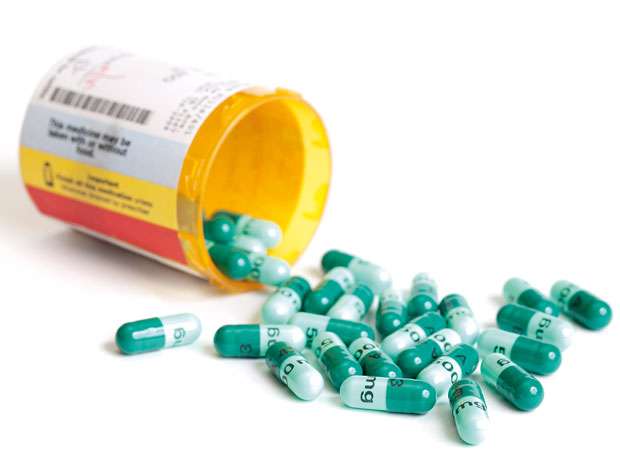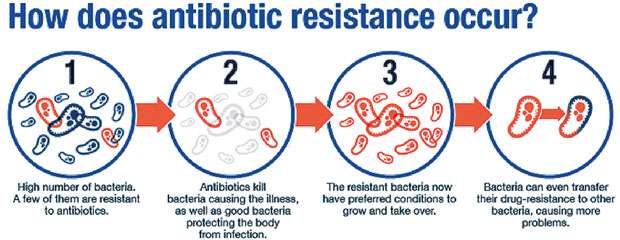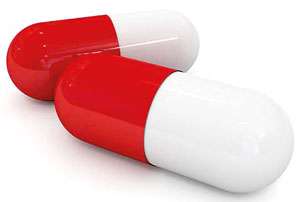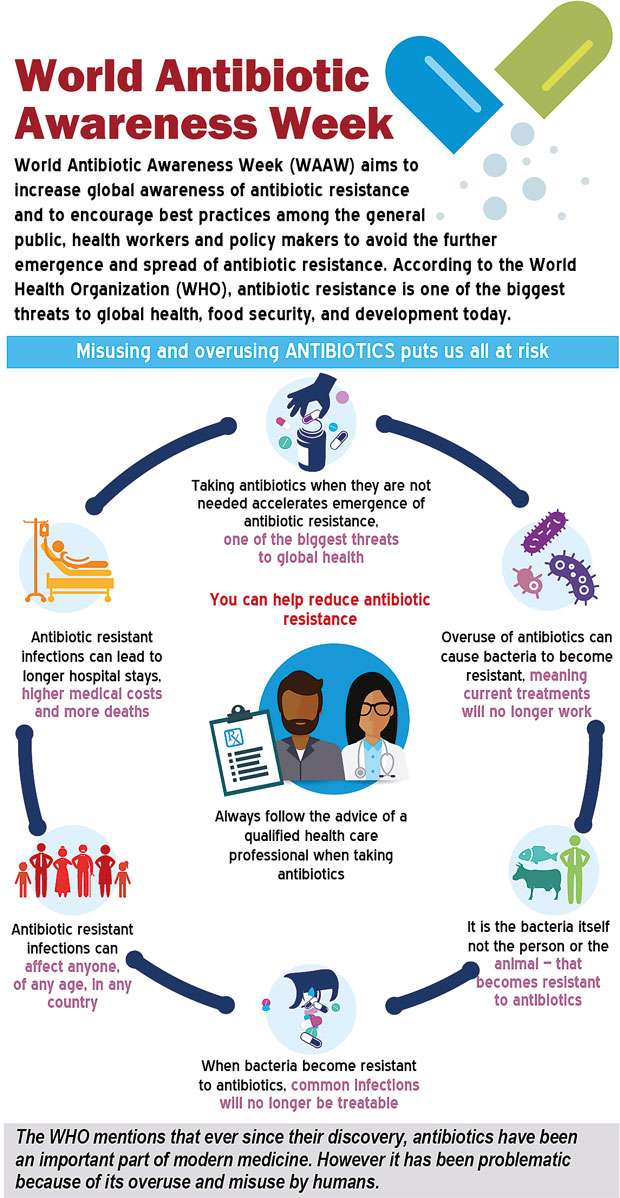Reply To:
Name - Reply Comment

 It is quite normal to gulp down an Amoxicillin tablet when one has a runny nose or a sore throat. But antibiotics - medicines that destroy or slow down the growth of bacteria- cannot treat viral infections. Antibiotics cannot kill viruses since they have different mechanisms to survive and replicate. However, antibiotics have become one of the commonly overused drugs to the point that antibiotic resistance has become a global concern. Hence each November, the World Antibiotic Awareness Week (WAAW) aims to increase global awareness on antibiotic resistance and to encourage the best practices among the general public, health workers and policy makers to avoid the further emergence and spread of antibiotic resistance.
It is quite normal to gulp down an Amoxicillin tablet when one has a runny nose or a sore throat. But antibiotics - medicines that destroy or slow down the growth of bacteria- cannot treat viral infections. Antibiotics cannot kill viruses since they have different mechanisms to survive and replicate. However, antibiotics have become one of the commonly overused drugs to the point that antibiotic resistance has become a global concern. Hence each November, the World Antibiotic Awareness Week (WAAW) aims to increase global awareness on antibiotic resistance and to encourage the best practices among the general public, health workers and policy makers to avoid the further emergence and spread of antibiotic resistance.
In order to shed light on this topic, the Health Capsule spoke to Dr. Deepal Perera, Consultant Paediatrician, Apeksha Hospital, Maharagama.

Threats indentified with antibiotic overuse
“Over the past few years, countries such as UK and USA haven’t done research on new antibiotics,” said Dr. Perera in his opening remarks. “So we are not getting new antibiotics and therefore have been using the same antibiotics unnecessarily. But we shouldn’t be using antibiotics for a few reasons. We have trillion of organs in our body and in organs such as the gastrointestinal tract there are over 1014 microorganisms. Most of these healthy bacteria will die as a result of antibiotic overuse. Hence there will be an unbalance of microorganisms in the body leading to unnecessary diseases such as diarrhoea. If we have good bacteria they will fight with new bacteria,” said the doctor.
Loose stools are a side effect of antibiotic resistance. Other side effects include nausea and vomiting. In the case of diarrohea we don’t have to prescribe antibiotics
Developing resistance
“By overusing antibiotics we develop antibiotic resistance,” he continued. “Take a look at Amoxicillin. It has been one of the antibiotics that has been widely overused. After a period of time our bodies become sensitive to this drug. Once the bacteria develop resistance, it doesn’t cure the condition, but will lead to several other complications. If we take children, most of their infections are viral. But they take Amoxicillin and parents complain that their children have diarrhoea. But sometimes it is parents who asks us to give antibiotics. Loose stools are a side effect of antibiotic resistance. Other side effects include nausea and vomiting. In the case of diarrhoea we don’t have to prescribe antibiotics. If necessary we could prescribe probiotics – microorganisms such as lactobacillus that when consumed as in a food or a dietary supplement maintain or restore beneficial bacteria to the digestive tract. The overuse of antibiotics will cause hypersensitive reactions such as urticarial rashes and fungal infections especially in the mouth and intestines. Therefore it’s better not to use antibiotics exceeding the recommended dosage,” said Dr. Perera.
Keeping infections at bay 
As antibiotic resistance has become quite an uncontrollable condition to follow, this year’s WAAW focuses on presenting people with a choice. Therefore with an objective to include WAAW in the Global Action Plan on Antibiotic Resistance, it will include five ‘focus’ days of tailored social media messaging around each of the objectives. One of these objectives is to carry out a campaign for all hospitals and healthcare centres to do their utmost to keep infections at bay with the best possible sanitation and hygiene measures available.
In Sri Lanka, most hospitals especially in the rural areas have lower levels of sanitation and maintenance of hygiene. This also comes with the issue of disposing clinical waste as well. Since many people would use one bathroom, maintenance isn’t regularly. “It is important to prevent infections by washing hands, drinking boiled water and cooking food using boiled water, eating cooked fish or meat etc,” Dr. Deepal added. “Since prevention is better, we need to find out where these infections originated and prevent further infections from occurring. This is a task vested upon the entire hospital staff, but in most instances it goes neglected,” he said.

Infants should be given breast milk up to six months because it contains the necessary antibiotic properties. They in turn immunise the infant’s system. In addition to that giving nutritious food and leading a healthy life can keep a person away from bacterial infections
WAAW 2018
In addition to keeping infections at bay, the other focus messages include :
Preventing antibiotic resistance
Since antibiotics like Amoxicillin have cured conditions such as the common cold, people assume that it could be used at their own will. If the prescription given by the doctor states that you have to take it for four to five days then you need to take it during that period and stop. But what people do is they self-medicate until all the symptoms have disappeared. With the issuance of antibiotics over the counter, incidence of antibiotic resistance is common.
“Preventing antibiotic resistance should start at infancy,” Dr. Perera continued. “Infants should be given breast milk up to six months because it contains the necessary antibiotic properties. They in turn immunise the infant’s system. In addition to that giving nutritious food and leading a healthy life can keep a person away from bacterial infections,” he said.
In order to reduce antibiotic resistance, the following steps could be followed:
